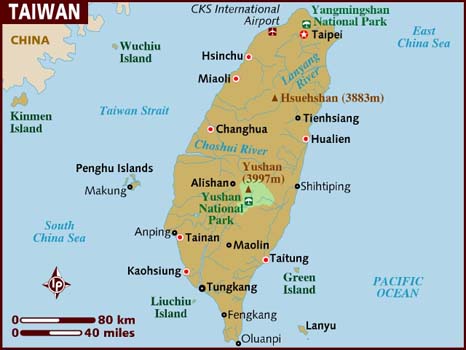Taiwan: no compromise on Democracy
February 21, 2019 | Expert Insights
The Taiwanese president, Tsai Ing-wen, said that the Taiwan would not accept any deal that could impact and destroy the sovereignty and democracy of the country. She said this in retaliation to her opposition KMT's proposed peace deal with China, if it wins a presidential election next year.
Background
Taiwan, home to twenty-three million people, is an island off the southern coast of China that has been governed independently from mainland China since 1949. Beijing and Taipei sharply disagree on the island’s status. The PRC asserts that there is only “one China” and that Taiwan is an inalienable part of it. Beijing says Taiwan is bound by an understanding reached in 1992 between representatives of the Chinese Communist Party (CCP) and the Kuomintang (KMT) political party then ruling Taiwan.
Referred to as the 1992 Consensus, it states that there is only “one China” but allows for differing interpretations, by which both Beijing and Taipei agree that Taiwan belongs to China, while the two still disagree on which entity is China’s legitimate governing body.
Chinese President Xi has emphasised the need for Taiwan to adhere to the “One China” principle. He referred to Taiwan’s independence forces as being “the biggest hindrance for the peaceful development of the cross-strait ties [and the] biggest threat of cross-strait stability.” Though Taiwan’s main political parties diverge on how best to manage the island’s relationship with Beijing, experts caution that both Beijing and Taipei must take responsibility for avoiding a crisis.

Analysis
President Tsai believes that the Taiwanese society will not accept any political agreements that would "destroy or harm Taiwan's national sovereignty." The president voiced out her criticisms after the opposition Kuomintang (KMT) Chairman Wu Den-yih's proposal to sign a peace agreement with China if the KMT regains the presidency in 2020.
The Taiwanese president also said: "We are a democratic country and our directions are very clear. We want freedom, democracy, security and prosperity. Taiwan's future should be decided by ourselves.”
In an exclusive interview with CNN, she issued a warning to Asia in the wake of increasing assertive foreign policy taken by China on the country to unify. However, President Xi Jinping in a speech that marked 40 years since the beginning of positive ties the two countries, urged the people of Taiwan to accept that the country "must and will be" reunited with China. This statement comes as a sharp rebuke to President Tsai Ing-wen, who said that her people wanted to maintain self-rule and are developing closer ties with the US.
In the interview, President Tsai also announced that she would be running for the re-election in 2020 to ensure that generations of Taiwanese will have the freedom to choose their future. In a briefing at the Presidential Office, she said that Taiwan wants to survive on its own and ensure economic prosperity, security, and "our democracy" rather than accept China's "one country, two systems" formula.
The peace treaty suggested by the opposition, KMT is known as the cross-strait peace treaty. It was proposed by Wu Den-yih, chair of the opposition party Kuomintang (KMT), who could be a potential presidential candidate in the upcoming re-election in the country. Opponents of a cross-strait peace treaty believe that such an agreement is based on the perception that Taiwan and China belong to the same country since Beijing does not recognise Taiwan as a sovereign state.
In the November mayoral and local elections, Tsai’s Democratic party suffered a severe loss against the KMT. As a result, her political support has gained some strain. However, her remarks on President Xi’s recent January speech on unification has helped her regain some support.
Counterpoint
The law of the state governs the decision to sign a peace deal. Any political negotiations and agreements concerning national sovereignty or identity would have to go through two public referendums - one consultative and one legally binding. Majority support for both referendums from the total electorate in Taiwan is necessary, according to the revised plan by the Mainland Affairs Council (MAC), Taiwan’s top government agency tackling cross-strait affairs.
Besides, a three-fourths majority vote in the legislature would indicate that at least 75 per cent of legislators are in attendance for both the two referendums.
Assessment
Our assessment is that the continuous resistance to unification will result in a deadlocked political crisis. We believe that upcoming re-elections are crucial and detrimental to the country. Despite the DPP regaining political support after a severe blow in local elections, their victory in the re-elections could be consequential to China. We feel that China may be utilising these elections as an opportunity to expand its authority in Taiwan further.
Read More:








Comments